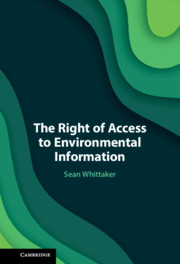Book contents
- The Right of Access to Environmental Information
- The Right of Access to Environmental Information
- Copyright page
- Contents
- Acknowledgements
- Table of Cases
- Table of Decisions of the Information Commissioner (England and Wales)
- Table of International Instruments
- Table of Findings and Recommendations of the Aarhus Convention Compliance Committee and Decisions of the Meeting of the Parties
- Table of European Union Legislative Instruments
- Table of National Legislative Instruments
- Table of Official Documents, Explanatory Memorandum and Guidance Documents
- Abbreviations
- 1 Introduction
- 2 Bridging the Gaps between Jurisdictions
- 3 The Aarhus Convention
- 4 The Environmental Information Regime in England
- 5 The Right of Access to Environmental Information in the United States
- 6 East Meets West
- 7 The Future Development of the Right of Access to Environmental Information
- 8 Conclusions, Key Findings and Future Directions
- Bibliography
- Index
7 - The Future Development of the Right of Access to Environmental Information
Applying Legal Transplant Theory to England, the United States and China
Published online by Cambridge University Press: 12 November 2021
- The Right of Access to Environmental Information
- The Right of Access to Environmental Information
- Copyright page
- Contents
- Acknowledgements
- Table of Cases
- Table of Decisions of the Information Commissioner (England and Wales)
- Table of International Instruments
- Table of Findings and Recommendations of the Aarhus Convention Compliance Committee and Decisions of the Meeting of the Parties
- Table of European Union Legislative Instruments
- Table of National Legislative Instruments
- Table of Official Documents, Explanatory Memorandum and Guidance Documents
- Abbreviations
- 1 Introduction
- 2 Bridging the Gaps between Jurisdictions
- 3 The Aarhus Convention
- 4 The Environmental Information Regime in England
- 5 The Right of Access to Environmental Information in the United States
- 6 East Meets West
- 7 The Future Development of the Right of Access to Environmental Information
- 8 Conclusions, Key Findings and Future Directions
- Bibliography
- Index
Summary
Chapter 7 explores the ramifications of the preceding analysis through the theoretical lens of legal transplant theory. It identifies what substantive and procedural elements are key to achieving the right’s environmental and participative aims and whether the selected jurisdictions’ environmental information regimes contain these elements. The chapter then considers why certain transplants are more likely to be successfully implemented than others, building on the distinction between the core substantive elements and the core procedural elements. This analysis will also consider the role of the Aarhus Convention in promoting or inhibiting legal transplants in light of its impact on the procedures of the selected jurisdictions’ environmental information regime. Finally, the chapter reflects on how the right of access to environmental information is likely to develop into the future, exploring the alternative conceptualisations of the right and considering whether a full convergence of the selected jurisdictions’ environmental information regimes is likely or desirable.
Keywords
- Type
- Chapter
- Information
- The Right of Access to Environmental Information , pp. 172 - 195Publisher: Cambridge University PressPrint publication year: 2021

